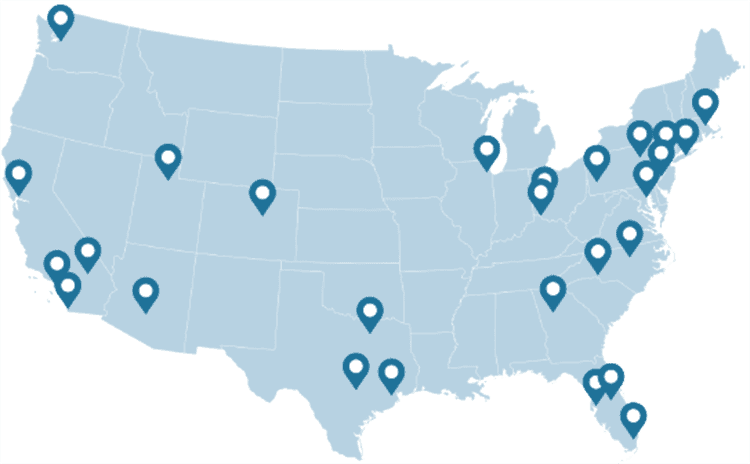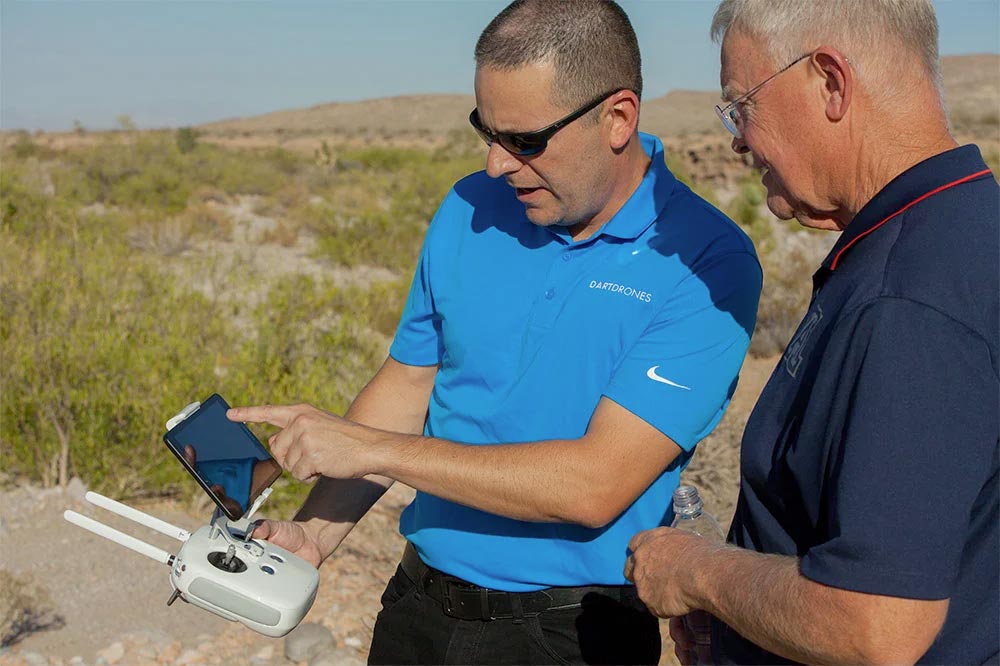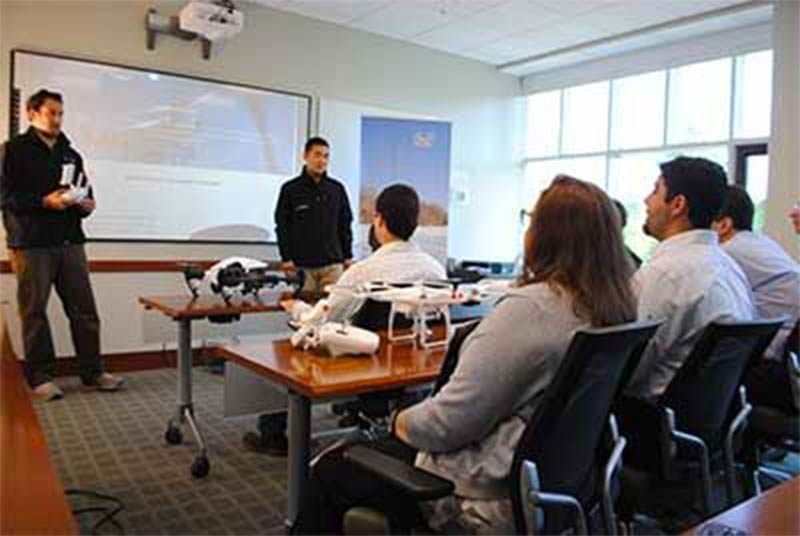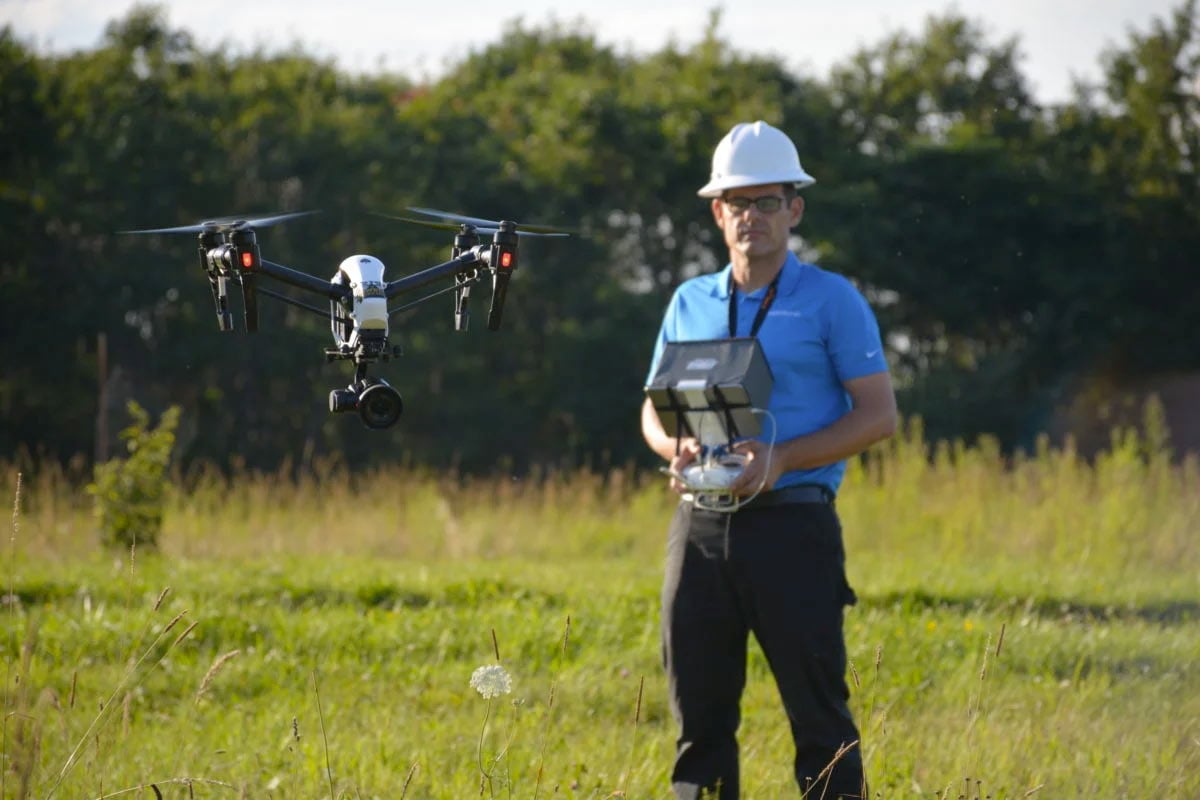
How to Make Money With a Drone: Starting a Drone Business
 By Jerry White
By Jerry White You may have heard that now is the time to start a drone business. But why now and where should you start? It’s the fun aspects of starting a drone business like choosing a name and creating a logo that do not necessarily need to be laid out in a complete guide. However, the aspects that will make your drone business stand out and succeed in this growing industry is why DARTdrones UAV Training School created this comprehensive guide.
If you are wondering how to make money with a drone or how to start a drone business, this guide will teach you all of the essential steps, tips, and information for starting a drone business under Part 107 FAA drone rules. We will cover how to obtain a Part 107 drone license, FAA drone rules and regulations, drone insurance, and more!
Why Start a Drone Business?
Over the past few years, the drone market has been rapidly growing with various industries integrating drones into their daily operations. When the industry became more viable after the release of the Part 107 FAA Drone Rules, aeronautical experts predicted that the industry was primed for entrepreneurial growth on all fronts. Since then, many entrepreneurs have been taking the initiative to start a drone business so that they can simultaneously grow with the UAS industry.
A recent report shows that the drone market is expected to grow to $63.6 billion by 2025. According to MarketsandMarkets, the growth of the drone industry is driven by increases in venture funding, the rise in demand for commercial drone data, and technological advancements.
The Association for Unmanned Vehicle Systems International (AUVSI) released an economic impact report on the integration of drones in the U.S. The full report lays out all economic benefits including the impact each U.S. state will have. The main economic changes include:
- The economic impact of the integration of drones will total more than $82.1 billion between 2015 and 2025
- Integrating drones will create an estimated 103,776 jobs by 2025
- Tax revenue to the states will total more than $482 million by 2025
- For every year that drone integration is delayed, the U.S. loses more than $10 billion ($27.6 million per day) in potential economic impact.
Here are the top reasons why people are joining this industry and starting a drone business:
- Industry growth
- Relatively low start-up costs
- High demand
- Numerous vertical opportunities
- Reasonable certification process
How to Start a Drone Business Under Part 107 FAA Drone Rules
There is a lot that goes into starting a drone business. Our UAV Training School has broken down the main components into 7 sections, with tons of information in each!
Part 107 Certification
Before doing anything for your drone business, it is crucial to take and pass the Part 107 exam. Without a Part 107 certification, you legally cannot fly a drone for any business purpose. Here are the steps to getting your Part 107 certification:
- Study for the exam – our UAV Training School recommends studying for 15-20 hours.
- Register with IACRA – you will need to register for an account with the FAA’s electronic application system, IACRA.
- Choose an approved testing center – find a local FAA testing center and register to take the Part 107 exam. Once you select a location, call to schedule your exam.
- Take the exam – to obtain your Part 107 Certification, you will need a passing score of 70% or higher.
- Submit Part 107 exam score – after passing the Part 107 exam, you will finalize your application and submit your Part 107 test score on IACRA. You will receive your test score immediately after completing the exam.
- Receive a temporary certificate – you will receive a temporary drone certificate within one week. Under the Part 107 FAA drone rules, you can legally fly for business purposes with a temporary drone certificate.
- Receive a permanent Part 107 certificate – Within 1 – 3 months, you will get your permanent certificate in the mail.
- Two-year renewal – recurrent training courses for certified drone pilots are now available online through the FAA Safety Team (FAASTeam) website. Learn more here.
Developing Your Drone Business Structure
This is the step where you will make some of the most important decisions to build a successful drone business. You have most likely already asked yourself how to start a drone business and how to make money with a drone, the below research and decisions will help get you where you need to be in launching your drone business. Within this step, you will need to complete the below:
- Drone Market Analysis
- Personal Fit
- Competitive Analysis
- Identifying a Target Market
- Target Market Pros and Cons
- Service Offerings
- Pricing Strategy (tip: see what your competition is charging for their products/services)
- Branding (this includes brand messaging, company voice, marketing materials, etc.)
- Choosing a Company Name
- Designing a Logo
- Developing a Tagline
Finding Customers For Your Drone Business
How will customers know about your products and services? How are you going to get the word out about your new drone business? Regarding the question of how to make money with a drone, this is the step that will lead to money generation by finding the right customers through marketing initiatives.
- Digital Marketing
- Content Marketing
- Search Engine Marketing
- Pay Per Click Strategy
- Creating Your First AdWords Campaign
- Display Ads
- Search Engine Optimization (how will customers find your business online without paid ads?)
- Identifying Search Engine Optimization (SEO) Keywords
- SEO Strategy
- Social Media Marketing
- Creating a Facebook Ad
- Advertising in Newspapers and Magazines
- Public Relations Strategy
Drone Business Operations
How will your drone business actually operate? This step is where you will make business decisions such as hiring staff, having an outside business create your website, and implementing a lead generation system. Consider the below components:
- Building to Scale
- Establishing Your Website
- Website Hosting
- Web Development Tools
- External Phone System
- Setting Up Business Emails
- Hiring Strategically
- Developing an Organizational Chart
- Customer Relationship Management (CRM) Systems
- Project Management Systems
- Tools for Internal Communication
Legal Considerations and Liabilities
- Obtaining Liability for Drone Pilots
- Types of Business Organizations
- Sole Proprietorships
- Partnerships
- Limited Liability Companies
- Employment Contracts
- Copyright Law
- Trademarks
- Privacy Considerations (tip: although there are no specific FAA drone rules prohibiting certified drone pilots from flying over private property, some local laws have been put into place that does limit where commercial operators can fly. Be sure to know the local rules!)
Drone Insurance
Accidents happen – even a Part 107 certified pilot with UAV training can crash a drone or have a mishap while in flight. Unpredictable weather, interference from radio towers, and UAV malfunction are all possibilities that can cause a drone to crash or fly away. This is why it is absolutely essential to obtain drone insurance. There are currently two types of drone insurance:
- Drone Liability Insurance – covers the cost of property damage or personal injury resulting from an sUAS operation. Liability insurance carries the highest premiums and provides the greatest amount of coverage.
- Drone Hull Insurance – helps you protect your personal or drone business property.
Our UAV Training School recommends either Verifly or Global Aerospace. Aside from obtaining insurance for your drone business, it is also important to consider the following:
- UAV Insurance
- Insurance vs. Warranty
- How Much Insurance Coverage Do You Need?
- Why Buy Drone Insurance?
- Factors Affecting Coverage
- Insurance Options
- Warranties
- Risk Mitigation
Part 107 Flight Criteria
Under the Part 107 FAA drone rules, all flights for your drone business must meet the below criteria:
- Drones weighing greater than 0.55 pounds must be registered. You can register your drone here.
- Pilots must be at least 16 years of age, understand all FAA drone rules, and have a Part 107 certification.
- Prior to each flight, the remote pilot in command must conduct a preflight inspection to ensure safe operations.
- There must be a designated remote pilot in command.
- Drones cannot fly from a moving vehicle.
- The drone must remain within visual line of sight at all times.
- Drones can only fly in the daytime.
- Drones cannot fly over people.
- Drones cannot fly higher than 400 feet or faster than 100 mph.
- Drones must always yield the right of way to all aircraft.
If you anticipate any flight being outside of the FAA drone rules, you must not perform that flight unless you are granted a Part 107 waiver from the FAA. Possible waivers can be requested for flying your drone at night, flying in certain airspace, and flying multiple drones. A waiver request must be submitted to the FAA at least 90 days prior to the start of the proposed operation.
How to Make Money with a Drone - Top Drone Business Ideas
As a UAV Training School, we have trained many drone entrepreneurs and helped launch various types of drone businesses. If you are thinking of starting a drone business, here are a few ideas with increasing demand to consider:
- Commercial Inspections
- Residential Home Inspections
- Industrial Inspections
- Drone Advertising/Marketing
- Drone Repair Services
- Mapping and Modeling
- Construction
- Mining
- Oil/Gas
- Land Monitoring
- Agriculture
- Photography/Videography
- Public Safety
- Precision Agriculture
Obstacles, Challenges, and Tips for Starting a Drone Business
Starting a drone business is not an easy task. Here are 11 obstacles and challenges that you might face as a drone entrepreneur (we have also included expert-approved tips!):
- Insurance – general liability and sUAS related insurance
- Marketing – how to you get your name out there and find jobs
- Portfolios – It’s important to put together various samples of the products you can provide. This is nice to show potential customers.
- Flight Records Management – this includes pilot hours, total aircraft flight hours, maintenance logs, FAA record-keeping, authorizations, waivers, work orders, etc.
- Service Contracts – every sUAS service provider should have a service contract(s) that they use with clients
- Pricing Structure – how do you price your services? This will depend on the geographic location, type of work/clients you have, and a variety of other factors. To eliminate the hassle and also have some financial security, we recommend considering long-term service contracts (6 months minimum) as opposed to “one-off” projects. That way, you can better ensure your income over time.
- Travel Policy/Rate – how far will you travel and what should be factored into the client invoice for travel expenses
- sUAS Routine Maintenance Schedules – in order to prevent total failure of components that may result in the loss of an aircraft, it is wise to develop a scheduled maintenance/replacement timeline for all sUAS systems owned by your drone business.
- Billing Terms – net 7, net 30, prepay, etc. Determine what makes the most sense for your business and your clients
- Filing for FAA Waivers/Authorizations – it’s important to be proactive and apply for necessary Part 107 waivers before you have solid contracts. It would not be ideal to land a huge project and then have to tell the client that they need to wait approximately 90 days for you to obtain FAA approval and legally perform the project.
- FAA Drone Rules – in order to have a legitimate drone business, you must always be operating within legal bounds, which means staying on top of all FAA drone rules. It’s also important to note when your Part 107 certification will expire.
How to Start a Drone Business with DARTdrones UAV Training
We understand that starting a drone business can be overwhelming. Our comprehensive online course, “Starting a Drone Business Under Part 107”, will teach you everything you need to know on how to make money with a drone and how to start a drone business. With launching a successful drone business, we take into consideration FAA drone rules, business strategy, operations, liabilities, and more.
Our “Starting a Drone Business Under Part 107” course was created by Chris Speicher Ph.D., the Director of Entrepreneurship at Marywood University, and co-founder at DARTdrones, along with DARTdrones Curriculum Director and Curriculum Developer for the US Navy’s UAS Program, Amelia Owre.

WHY DARTDRONES? We have a proven track record for training pilots in dozens of industries.
INSTRUCTORS
Our instructors have manned aviation experience flying airplanes and helicopters and have gained the highest drone piloting recognitions in the industry. Many own successful UAS businesses themselves.
NATIONWIDE
As featured on ABC's Shark Tank, we are the nation's leading drone training company with an extensive network of alumni and partners throughout the country.
MATERIAL
Created and refined by UAS training experts, our curriculum is the best in the industry and has been tried and tested by clients in dozens of industries.
TRAINED
With a community of over 65,000 drone enthusiasts across the US and internationally, DARTdrones is at the forefront of UAS technology.
Expert Instructors
Our students absolutely love our instructors! Our classes are engaging, fun, and extremely informative.

Advanced Training Courses
We don’t just train our students on the basics. We have extensive advanced training courses to help our alumni succeed in mapping, inspections, disaster response, aerial photography, night operations, and search and rescue.

Industry Certified and Vetted Curriculum
Our curriculum has been vetted and certified by AUVSI, the leading UAS industry association, to ensure professional quality.


Learn More Today!


